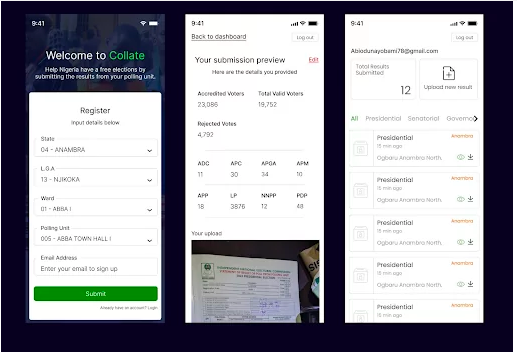A live result-viewing website named “collate” has been established by two Nigerian technology specialists in advance of the gubernatorial and state houses of assembly elections across 28 states in Nigeria, scheduled for March 18, 2023.
The announcement of this breakthrough was made on Twitter by IT specialists Oo Nwoye and Ozo Omosigho. They highlighted that it was done in an effort to avoid the controversy-plagued presidential election on February 25, 2023.
The introduction of Collate, an open and crowdsourced online result collation and viewing platform (ReV) created to aid transparency in the next gubernatorial elections in Nigeria, has been announced by tech executives Oo Nwoye and Ozo Omosigho.
The statement read: “Collate seeks to have robust, recorded, and centralised data of all polling unit results in all states in real-time,” according to the mission statement of Collate, “in the aftermath of the controversy that marked the result of Nigeria’s previous presidential election.”
It went on. The platform is intended to collate and broadcast, in real time, the results of governorship elections across the country to aid transparency in the exercise.
Read also: Nigeria blocks 1.2 million cyber attacks during Presidential elections
How the Collate platform works
Nwoye and Omosigho explained that the platform would use data from Nigerians across the over 176,000 polling units in the country, and the results would be readily available to viewers across the world.
According to them, the platform will address some of the concerns of Nigerians about INEC’s election-viewing portal, iREV, as they would now be able to view in real-time the results from every polling unit in the country.
At Least one electorate or party supporter of all polling units across the country has to register on the “collate” platform and upload the results of their polling unit. The results will be viewed by everyone, anywhere in the world, in real-time. This way, all polling unit results will be collated and counted by the populace to compare with the INEC official result, and any rigging attempt will be detected.
“While party agents contested election results during INEC result announcements, nobody really had real-time evidence to present. There was nowhere visible that the results were all aggregated. So it became difficult to prove,” Nwoye said.
“Though a lot of people have introduced structured solutions like forms to crowdsource results, these solutions are not entirely designed to capture all the polling units and offer real-time results as they are dependent on voters sporadically finding out about those forms on election day, which may be too late.
“So, from my product knowledge, I thought it would be good to know in advance about polling units without coverage and plan for coverage.” He added.
Nwonye also noted that the platform would indicate clearly, which polling units were disqualified or disenfranchised with voters pre-registering and indicating their polling units. It will also help identify the Polling Units that risk not having results posted on Collate and push to get voters from those PUs to register on the site. What’s key in this product is the ability to plan ahead, he said.
The tech leaders behind the initiative have been working hard to develop the platform, which they anticipate will be a necessary game-changer for the coming elections. They are dedicated to maintaining a nonpartisan approach and prioritize the elimination of corruption and fraud in the electoral process.
“The difference with what we’re doing is that we allow voters to independently collect results and have proof,” Omosigho said. “When you can point to proof, then you can stop any malpractice in the voter process. Now any candidate from any political party will have access to clear evidence of images taken at the polling units, completely independent of INEC.”
To safeguard the integrity of the election, Collate ensures that voters who submit results to their platform will be protected, and no personally identifiable information will be disclosed to the public.
